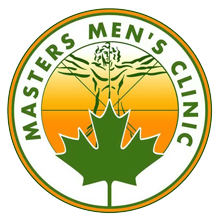What is Andropause?
Andropause is an area of growing interest for physicians, researchers and of course men.
The existence of Andropause is now recognized by the medical world – including the Canadian Andropause Society – and by Canadians alike.
In fact, a recent Angus Reid survey found that 70% of the general public share the belief that men experience a mid-life stage similar to women’s menopause. Andropause (also called “male menopause”) is a normal part of aging; although, for some men it is accompanied by a gradual and undesired decline in their sexuality, mood and overall energy. Sometimes it can even expose men to more serious health risks.
As with women, Andropause begins at a time when life often offers some of its greatest rewards. This site has been designed to arm you with actionable information about Andropause – what causes it and what you can do about it. And if you are going through Andropause, we hope this information will help you maintain a healthy and active quality of life throughout your middle-years.
Between the ages of 40 and 80+, men can experience a clinical syndrome similar to the female menopause, called andropause. For men, unlike women, there isn’t a clear-cut signpost to mark this transition.
Andropause, just like menopause, is characterized by a drop in hormone levels. The bodily changes, as a result of reduced hormones, occur very gradually in men and may be accompanied by adverse changes in attitudes and moods, ongoing fatigue, a loss of vitality, and decreased sex drive. Added to this, there is usually a decline in physical agility and ability. What’s more, medical studies show that this decline in testosterone can actually contribute to the risks for other health problems like heart disease and weak bones.
For most men, since this happens at a time when they are beginning to take stock of their achievements and direction in life, it’s often difficult to realize that the developing changes are related to more than just outside circumstances.
Unlike menopause, which generally occurs in women during their mid-forties to mid-fifties, men’s “transition” may be much more gradual and expand over many decades. Attitude, psychological stress, alcohol, injuries or surgery, medications, obesity and infections can contribute to its onset.
Diagnosing Andropause
A reason why Andropause has been under-diagnosed over the years is that symptoms can be vague and can vary a lot among individuals. Some men find it difficult to admit that there’s even a problem. And often physicians didn’t always think of low testosterone levels as a possible culprit. So these factors often lead doctors to conclude that symptoms were related to other medical conditions (i.e. depression) or were simply related to aging and often encouraged their patients to accept that “they were no longer spring chickens”. But this situation is changing.
New blood testing methods are available and there is a increased interest in men’s’ aging among medical researchers. In fact, so much attention is being focused on Andropause that major efforts are underway to quickly share emerging scientific information with Canadian physicians.
Andropause… New Phenomenon?
Yes and no. Obviously, not for nature. As a clinical phenomenon, andropause was first described in medical literature in the 1940’s. In spite of that description, until now, the ability to effectively diagnose this syndrome has been limited.
Andropause has gone through a long period where it was under-diagnosed and under-treated. In fact, it even went unacknowledged! Fortunately, doctors now have a new sensitive “bioavailable testosterone” test for measuring testosterone. This test measures active testosterone which is the testosterone that is actually doing something. With this technology, andropause has now been identified as a legitimate clinical concern!
Since men are living longer, there is heightened interest in the andropause. At the Masters Men’s Clinic, we are dedicated to improving the clinical approach to this significant life phase which was identified so long ago.
Men… Hormones Decline Gradually
Unlike menopause, which generally occurs in women during their mid-forties to mid-fifties, men’s “transition” is much more gradual and it happens over many decades. Attitude, psychological stress, alcohol, injuries, surgery, medications, obesity and infections can contribute to its onset.
With age, a decline in testosterone levels will occur in virtually all men, although there is no way of predicting who will experience andropause symptoms severe enough to seek medical help, nor is it predictable at what age symptoms will occur in a particular individual. Where andropause is concerned, each man’s symptoms may be different.
A Questionnaire
Review the following questions.
If you answered yes to question #3 or to any two of the other questions, call the Masters Men’s Clinic to see how you can recover your vitality.
Could I Need Help With the Andropause?
- Do you have a decrease in strength and/or endurance?
- Do you often have a general lack of energy?
- Do you have a decrease in your sex drive (libido)?
- Do you often feel irritable?
- Do you take longer to recover from exercise or do your injuries heal less quickly?
- Have you noticed a decreased enjoyment of life?
- Have you noticed a decline in your ability to participate in recreational activities?
- Have you noticed a change with your memory?
- Are your erections/ejaculations less strong?
- Do you have trouble getting a night of restful sleep?
- Is it difficult to get and stay in shape?
- Are you eating the same or even less and putting on weight?
- Do you feel that you are under chronic stress?
- Are you more easily frustrated than previously?
- Do you frequently suffer from joint pain or prolonged stiffness?







